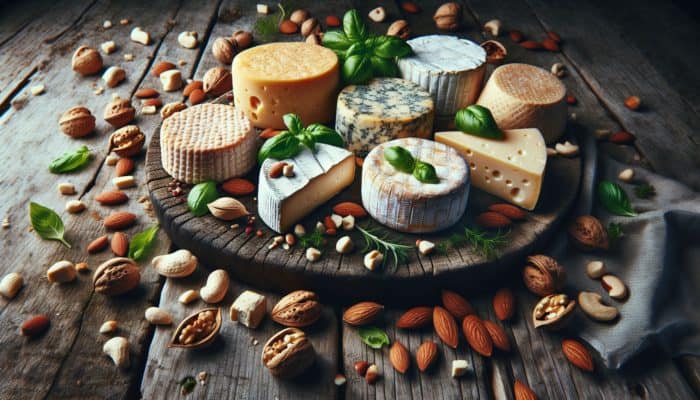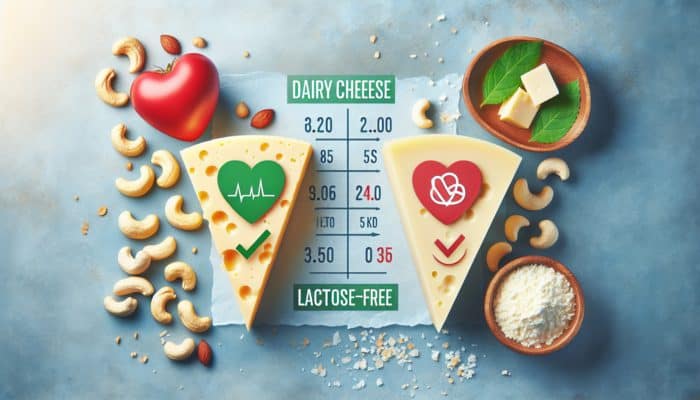Explore the Key Ingredients for Creating Irresistible Vegan Cheese Alternatives
Discover the Top Plant-Based Milk Options for Crafting Vegan Cheese

When embarking on the journey of creating vegan cheese alternatives, making informed choices about plant-based milks is essential. These milks serve as the foundation of your cheese, contributing a creamy texture and distinct flavour profiles that significantly enhance the culinary experience. Popular selections include soy, almond, and cashew milk, each with unique characteristics that play a vital role in the final product. Soy milk is particularly valued for its rich, creamy texture and high protein content, providing an excellent substitute for traditional cheese. In contrast, almond milk delivers a lighter consistency with a subtle nuttiness, while cashew milk is exceptionally rich and creamy, ideal for replicating the indulgent mouthfeel synonymous with conventional cheeses.
As you select a plant-based milk for your vegan cheese production, it is crucial to assess the texture and flavour of the desired end product. Some may gravitate towards the luxurious texture of cashew milk for a creamy, spreadable cheese, while others might prefer almond milk for a lighter alternative. Experimenting with various brands is beneficial, as some may contain additives that can alter both taste and consistency. It is always advisable to opt for unsweetened varieties to prevent unexpected flavours that could interfere with your cheese-making process.
Unveiling the Advantages of Nutritional Yeast in Vegan Cheese Recipes
Nutritional yeast emerges as a game-changing ingredient in the realm of vegan cheese, lauded for its ability to impart an authentic cheesy flavour without the inclusion of any dairy. This ingredient has become a staple in numerous vegan kitchens due to its versatility and impressive array of health benefits. Here are compelling reasons to incorporate nutritional yeast into your vegan cheese creations:
- Rich in B vitamins, particularly B12 when fortified.
- High in protein, offering a complete amino acid profile.
- Contains antioxidants that promote overall health.
- Low in calories and fat, making it a guilt-free enhancement.
Integrating nutritional yeast into your recipes not only boosts the flavour but also enriches the nutritional profile, establishing it as an essential component in your vegan cheese-making arsenal. Its cheesy, nutty essence can elevate even the simplest dishes into gourmet delights, ensuring satisfaction for even the most discerning cheese enthusiasts.
Crucial Thickening Agents for Achieving Perfect Vegan Cheese Texture
Attaining the desired texture is fundamental in the art of vegan cheese making, with thickening agents playing a pivotal role in this process. The most commonly employed options include agar agar, tapioca starch, and carrageenan. Agar agar, derived from seaweed, is perfect for creating a firm cheese that slices effortlessly. Conversely, tapioca starch imparts that coveted stretchy, melty quality, making it ideal for vegan mozzarella. Carrageenan, another seaweed extract, contributes to a creamy consistency and is often found in commercial vegan cheeses.
When selecting thickening agents, it is vital to consider the type of texture you aspire to achieve. For a soft, spreadable cheese, relying solely on agar agar may be insufficient; a combination of tapioca starch and nutritional yeast can create a delightful, melt-in-your-mouth experience. Embrace the spirit of experimentation; the right blend can elevate your vegan cheese from a mere alternative to an indulgent treat.
Proven Strategies for Successfully Crafting Vegan Cheese Alternatives

Exciting Vegan Cheese Recipes to Try at Home
The realm of vegan cheese recipes has witnessed a remarkable surge in popularity, with both home cooks and professional chefs uncovering innovative methods to create mouth-watering alternatives. For instance, cashew cheese spreads have gained immense popularity owing to their rich texture and versatility. A basic cashew cheese can be prepared by soaking cashews and blending them with garlic, lemon juice, and nutritional yeast to create a creamy dip that pairs excellently with crackers or fresh vegetables.
Another well-loved recipe is almond feta, where almonds are blended to a smooth consistency with lemon juice, garlic, and fresh herbs. This tangy cheese alternative is perfect for enhancing salads, spreading on bread, or enjoying as a standalone snack. Additionally, coconut-based cream cheeses have gained popularity as they combine coconut cream with a mix of herbs and spices, offering a delightful tropical twist to traditional cheese platters.
These examples illustrate that the universe of vegan cheese is both diverse and accessible, with numerous recipes that can be easily replicated in the comfort of your home kitchen. The key is to start with straightforward recipes and gradually incorporate more intricate flavours and techniques as your confidence in cheese-making flourishes.
Effective Methods for Fermenting Your Vegan Cheese
Fermentation can dramatically enhance your vegan cheese by introducing layers of flavour and a tangy profile reminiscent of aged dairy cheeses. To begin fermenting your vegan cheese, consider using rejuvelac (a fermented grain drink) or specific probiotic cultures. Here are some practical tips to facilitate the fermentation process:
- Utilise soaked nuts or seeds as the foundation for your cheese.
- Add a small quantity of rejuvelac or probiotics to your mixture.
- Cover the mixture with a breathable cloth and allow it to sit at room temperature for 12-48 hours, depending on your desired level of tanginess.
- Taste the mixture periodically to monitor flavour development and adjust the fermentation time as needed.
The beauty of fermentation lies in its ability to elevate the complexity of flavours, transforming simple ingredients into extraordinary creations. This age-old process enriches vegan cheese alternatives and aligns with the growing interest in fermented foods and their associated health benefits.
Understanding the Nutritional Profile of Vegan Cheese Alternatives

When assessing the nutritional profile of vegan cheese alternatives, it is vital to compare them with traditional dairy cheeses. Generally, vegan cheeses offer lower levels of saturated fat and cholesterol, making them healthier options for heart health. For example, many cashew-based cheeses are abundant in healthy fats and provide a good source of protein while being lactose-free, rendering them suitable for individuals with dairy intolerances.
Nonetheless, it is crucial to acknowledge that not all vegan cheeses are created equal. Some may be heavily processed and contain additives and preservatives. In contrast, whole-food-based vegan cheeses, crafted from nuts and seeds, often retain more nutrients and deliver beneficial fats and vitamins.
Moreover, numerous vegan cheeses are fortified with essential vitamins such as B12, addressing a common concern for those adhering to plant-based diets. Ultimately, the nutritional profile can vary significantly, making it essential for consumers to scrutinise labels and select high-quality products that align with their dietary needs.
How Do Different Plant-Based Milks Affect Vegan Cheese Texture and Taste?
The selection of plant-based milk profoundly influences the texture and flavour of your vegan cheese creations. For instance, almond milk typically results in a lighter, slightly nutty flavour, making it ideal for soft cheeses or spreads. However, its lower fat content may impact the creaminess of firmer cheeses.
In contrast, soy milk, which is rich in protein and fat, can produce a more substantial cheese, making it an excellent choice for creamy and stretchy varieties, such as vegan mozzarella. Its neutral flavour profile allows other ingredients, such as nutritional yeast and spices, to shine through, enhancing the overall taste and appeal.
Cashew milk is particularly noteworthy for its richness, often resulting in a creamier texture that closely resembles traditional cheese. The higher fat content contributes to a luxurious mouthfeel, making it suitable for various cheese styles, from soft spreads to firmer slices. Understanding how each plant-based milk impacts the final product empowers creators to make informed choices and cultivate the desired cheese experience.
Practical Tactics for Resolving Common Vegan Cheese-Making Challenges
Creating vegan cheese can be a fulfilling endeavour, yet it does present certain challenges. Common issues such as graininess, separation, or undesirable flavours can detract from your cheese-making efforts. If you encounter a grainy texture, consider blending your mixture for an extended period to ensure a smooth consistency. Additionally, soaking nuts adequately before blending can help achieve a creamier outcome.
Separation may occur if the mixture is not properly emulsified. To counter this, incorporate ingredients such as tapioca starch or an extra splash of plant-based milk to help bind the mixture. Unpleasant flavours can arise from using expired ingredients or incorrect ratios, making it crucial to prioritise freshness and balance in your recipe.
Always taste your mixture throughout the process; this practice not only enhances the final product but also helps identify any issues early on. By employing these troubleshooting techniques, you will be better equipped to craft a consistent and delicious vegan cheese that impresses your friends and family.
What Are the Steps to Create Vegan Cheese at Home?
Collecting Essential Tools for Vegan Cheese Making
To embark on your vegan cheese-making journey, several essential tools will pave the way for your success. A blender is indispensable, as it helps you achieve the creamy, smooth consistency desired in many cheese alternatives. For recipes requiring straining, a cheesecloth or nut milk bag will prove invaluable in removing excess liquid and achieving the ideal texture.
Moulds or containers are also necessary for shaping your cheese. Silicone moulds are excellent choices, as they facilitate easy removal and can create various shapes. Lastly, a thermometer can be beneficial, particularly if you venture into fermentation, as maintaining the correct temperature is crucial for developing flavours.
Equipping yourself with the right tools not only simplifies the cheese-making process but also enhances the quality of the final product. Invest in these essentials, and you will be well-prepared for your vegan cheese adventures.
Beginner-Friendly Recipes to Kickstart Your Cheese-Making Experience
Starting with simple recipes is vital for building confidence in your cheese-making skills. One of the easiest options is cashew cheese, where soaked cashews are blended with nutritional yeast, garlic, lemon juice, and a pinch of salt for flavour. This creamy spread can be enjoyed on crackers or as a delightful dip for fresh vegetables.
Another excellent beginner recipe is almond feta. Soak almonds overnight, then blend with lemon juice, herbs, and garlic until smooth. After blending, place the mixture in a cheesecloth and shape it into a log. Refrigerate to firm up, and you will have a delightful cheese that can elevate any dish.
Lastly, consider crafting a basic vegan ricotta using blended tofu, nutritional yeast, lemon juice, and seasonings. This versatile cheese can be incorporated into pasta dishes, used as a topping on pizzas, or spread on toast. These straightforward recipes serve as a launching pad for exploring more complex flavours and techniques as your skills develop.
Strategies for Overcoming Common Vegan Cheese-Making Obstacles
While the process of making vegan cheese can be enjoyable, encountering problems is not uncommon. Issues like texture inconsistencies or flavour imbalances can arise, but they are typically manageable with the right approach. If your cheese turns out too runny, consider adding a thickening agent such as tapioca starch or agar agar to help bind the mixture.
Conversely, if your cheese is excessively thick, a splash of plant-based milk can help restore a more desirable texture. For flavour challenges, remember that you can always adjust seasoning after blending. Adding more nutritional yeast, herbs, or acids, such as lemon juice, can significantly elevate the final taste.
Lastly, if you experience a grainy texture, consider blending your mixture for a longer period or ensuring that your nuts are adequately soaked before blending. These troubleshooting tips will empower you to refine your vegan cheese-making process and produce consistently delightful alternatives.
Fermentation Techniques for Elevating Flavour in Vegan Cheese
Fermentation is an exciting method that adds complexity and depth to your vegan cheeses. To begin, introduce probiotic cultures or rejuvelac to your nut or seed base. Soaking your nuts or seeds ahead of time is advisable, as this softens them and simplifies the blending process.
Once you have blended your base with the fermentation agent, transfer the mixture to a clean container and cover it with a breathable cloth. Allow it to sit at room temperature for 12-48 hours, depending on your desired level of tanginess. During this period, the mixture will develop its unique flavours, so tasting it periodically is essential to gauge its progress.
After fermentation is complete, you can use the fermented cheese as a base for additional recipes or enjoy it as is. This technique not only enhances the flavour of the cheese but also introduces beneficial probiotics, contributing to gut health and overall well-being.
Optimal Practices for Storing and Aging Vegan Cheese
Properly storing and aging your vegan cheese can significantly influence its texture and flavour profile. For short-term storage, keep your vegan cheese in an airtight container in the fridge. Most homemade vegan cheeses can last up to a week, although consuming them fresh is optimal for the best taste and texture.
For aging, you will want to create an environment with controlled temperature and humidity. Some enthusiasts utilise caves or dedicated cheese fridges to effectively manage these conditions. Wrap your cheese in cheese paper or parchment to allow it to breathe while preventing excessive moisture loss.
As your cheese ages, you will notice changes in flavour and texture, often becoming more robust and complex. Regularly check on your cheese, and don’t hesitate to adjust humidity levels if it appears too dry or too moist. This careful attention during storage and aging will lead to a more rewarding and flavourful vegan cheese experience.
What Are the Benefits of Choosing Vegan Cheese Alternatives?
Assessing the Environmental Impact of Vegan Cheese Production
The production of vegan cheese alternatives generally has a lower environmental footprint compared to traditional dairy cheese. Dairy farming is a resource-intensive practice, requiring substantial amounts of water, land, and feed, while also contributing to greenhouse gas emissions. In contrast, the production of plant-based cheese tends to utilise fewer resources and generate less pollution.
By selecting vegan alternatives, consumers can significantly reduce their environmental impact. Numerous brands prioritise sustainable sourcing and eco-friendly practices, further enhancing the positive effects of choosing vegan cheese. Embracing vegan cheese is not merely a dietary choice; it signifies a commitment to fostering a sustainable future for our planet.
Uncovering the Health Benefits Associated with Vegan Cheese
One of the most compelling reasons to explore vegan cheese alternatives is their potential health benefits. Many vegan cheeses are lower in saturated fats and cholesterol compared to their dairy counterparts, making them healthier options for heart health. This is particularly beneficial for individuals concerned about managing cholesterol levels or mitigating the risk of heart disease.
Additionally, vegan cheeses are typically free from lactose, which can cause digestive issues for many individuals. By opting for plant-based alternatives, you can relish the creamy, rich flavours of cheese without the discomfort associated with dairy. Moreover, many vegan cheeses are enriched with beneficial nutrients, such as omega-3 fatty acids and antioxidants, which contribute to overall health and wellness.
Considering Ethical Aspects in Choosing Vegan Cheese
Opting for vegan cheese aligns with ethical considerations regarding animal welfare. Dairy farming often involves practices that can be distressing for animals, including confinement and separation from their young. By choosing vegan alternatives, consumers actively contribute to reducing the demand for dairy products, thereby advocating for more humane treatment of animals.
Furthermore, supporting plant-based products encourages the growth of ethical companies that are devoted to sustainable and fair practices. This conscious choice allows consumers to align their dietary habits with their values, fostering a sense of responsibility and compassion towards animals and the environment.
Celebrating Variety and Innovation in Vegan Cheese Alternatives
The realm of vegan cheese alternatives is characterised by a remarkable diversity of flavours and textures, driving innovation within the food industry. From cashew-based spreads to nutty feta or smoky gouda, there is an extensive range of options that cater to diverse dietary preferences and culinary applications.
This innovation is not only thrilling for consumers but also inspires chefs and home cooks to experiment with new flavour combinations and techniques. As demand for vegan products continues to rise, the market responds with an influx of creative and delicious offerings, ensuring that everyone can find a vegan cheese that suits their taste.
Research-Backed Benefits of Crafting Vegan Cheese Alternatives
Insights from Studies on the Digestibility of Vegan Cheese
Research indicates that vegan cheese can be easier to digest for many individuals compared to traditional dairy cheeses. This is largely due to the absence of lactose, which can cause digestive discomfort in those with lactose intolerance. Studies suggest that many individuals who struggle with dairy find relief when they switch to plant-based alternatives.
Moreover, the simplicity of ingredients in homemade vegan cheese often results in fewer additives and preservatives, contributing to easier digestibility. Consequently, more individuals are discovering that vegan cheese can be a satisfying and gut-friendly option.
The Importance of Nutrient Fortification in Vegan Cheese Products
Many commercial vegan cheeses are fortified with essential vitamins and minerals, enhancing their nutritional value. For example, some brands add vitamin B12, which is crucial for vegans, as this nutrient is predominantly found in animal products. Additionally, calcium and vitamin D are often included, making vegan cheeses more comparable to dairy cheese in terms of nutrient content.
When creating vegan cheese at home, you can also incorporate fortified ingredients to boost nutritional benefits. By selecting high-quality brands or fortifying your recipes, you can ensure your vegan cheese contributes positively to your overall diet.
Shifting Consumer Acceptance Trends for Vegan Cheese Alternatives
Surveys indicate a growing acceptance and demand for vegan cheese alternatives among consumers. As awareness about the health and environmental benefits of plant-based diets increases, more individuals are willing to explore vegan cheese options.
This trend is reflected in the expanding variety of products available on supermarket shelves, with numerous brands innovating to provide tasty alternatives that mimic traditional cheeses. The increasing consumer interest encourages companies to invest in research and development, resulting in continuous improvements in flavour and texture.
Assessing the Environmental Impact of Vegan Cheese Production
The environmental impact of vegan cheese production is significantly lower than that of dairy cheese. Research shows that plant-based dairy alternatives require fewer natural resources and produce lower emissions. Transitioning from animal-based to plant-based products contributes to sustainability efforts, appealing to eco-conscious consumers.
By making choices that support vegan cheese alternatives, individuals can actively participate in reducing their environmental footprint. This commitment not only benefits personal health but also contributes to broader efforts to combat climate change and conserve natural resources.
Health Benefits Associated with Consuming Vegan Cheese
Switching to vegan cheese can lower cholesterol and saturated fat intake, potentially reducing the risk of heart disease. Many individuals have transitioned to plant-based diets for this reason, discovering that vegan cheeses can provide a satisfying alternative without the associated health risks.
Additionally, incorporating whole-food ingredients into homemade vegan cheese allows for better control over what goes into your food. This transparency can lead to healthier choices that align with personal health goals, making vegan cheese not just a dietary choice but a lifestyle enhancement.
Advanced Techniques for Mastering Vegan Cheese Crafting
Perfecting the Aging and Ripening Process for Vegan Cheese
Aging vegan cheese is an advanced technique that can develop intricate flavours over time. To create aged cheese, select a base of nuts or seeds and blend with fermentation agents. After the initial fermentation, transfer the mixture to a suitable aging container while maintaining controlled temperature and humidity.
The aging process can last from a few days to several weeks, depending on the desired flavour intensity. As the cheese ages, its texture will evolve, typically becoming firmer while flavours deepen and become more pronounced. Regularly monitoring your cheese during the aging process is crucial, enabling you to fine-tune flavour profiles and texture.
This technique requires patience and careful attention but can yield extraordinary results, providing a gourmet touch to your vegan cheese repertoire.
Infusing Unique Flavours into Your Vegan Cheese Creations
Infusing flavours into your vegan cheese opens up a world of exciting possibilities. Experimenting with herbs, spices, and other ingredients can create unique and captivating varieties. For instance, adding smoked paprika, garlic powder, or fresh basil can transform a basic cashew cheese into a bold dip or spread.
You can also explore sweet flavours by incorporating ingredients like maple syrup or vanilla extract to create dessert cheeses. The beauty of making your own vegan cheese lies in the ability to tailor it to your preferences and dietary needs, ensuring that the final product is both delicious and satisfying.
Encouraging creativity in your cheese-making process not only enhances the flavours but also allows you to explore the diverse culinary world of plant-based cooking.
Producing a Variety of Textures in Your Vegan Cheese
Mastering techniques to create diverse textures is essential for crafting a well-rounded selection of vegan cheeses. For soft, spreadable cheeses, focus on blending your base until smooth, incorporating ingredients like coconut cream or cashew milk for added creaminess.
For firmer cheeses, consider incorporating more nuts or using thickening agents like agar agar or tapioca starch to achieve a sliceable consistency. You can also experiment with pressing the cheese mixture into moulds under weight, which promotes a firmer texture.
For a unique experience, create layered cheeses with different textures by combining soft and firm bases. This technique not only enhances visual appeal but also provides a delightful contrast in mouthfeel, making your vegan cheese offerings truly stand out.
Frequently Asked Questions About Vegan Cheese Alternatives
What is the primary ingredient in vegan cheese?
Vegan cheese is typically crafted from plant-based ingredients, including nuts, seeds, soy, and coconut. These bases are often blended with nutritional yeast, spices, and thickening agents to create a creamy consistency and flavour that mimics traditional cheese.
Is vegan cheese a healthier choice compared to dairy cheese?
Generally, vegan cheese is lower in saturated fat and cholesterol, making it a healthier alternative for heart health. Additionally, it’s often free from lactose, which can cause digestive issues for some individuals.
Can I prepare vegan cheese without using nuts?
Absolutely! Vegan cheese can be made from various bases, including tofu, soy, coconut, or even vegetables. There are numerous nut-free recipes available that still deliver delicious flavours and textures.
How long can homemade vegan cheese be stored?
Homemade vegan cheese typically lasts about a week when stored in an airtight container in the fridge. For longer storage, consider freezing, but be aware that some textures may change once thawed.
Is vegan cheese suitable for baking purposes?
Many vegan cheeses melt well and can be used in baking, particularly those made from cashews or tapioca starch. However, it’s essential to select the appropriate type for your dish to achieve the desired meltability.
Can vegan cheese undergo aging like dairy cheese?
Yes, vegan cheese can be aged to develop complex flavours. Techniques involve fermenting the cheese base and storing it under controlled conditions to promote flavour development over time.
What are the most effective thickening agents for vegan cheese?
Popular thickening agents for vegan cheese include agar agar, tapioca starch, and carrageenan. Each provides unique characteristics that can help achieve different textures and consistencies in your cheese.
Are there vegan cheeses available that taste similar to cheddar?
Yes, several brands produce vegan cheeses that emulate the flavour of cheddar using a combination of nuts, nutritional yeast, and spices. Homemade versions can also replicate the taste of cheddar with the right ingredients and seasonings.
How can I enhance the flavour of my vegan cheese?
You can improve the flavour by incorporating herbs, spices, nutritional yeast, and acids like lemon juice. Experimenting with fermentation techniques can also lead to richer and more complex flavours in your cheese.
Can you recommend any commercial vegan cheese brands?
Several brands, such as Violife, Daiya, and Kite Hill, are well-regarded for their vegan cheese products. Each offers a variety of flavours and textures to cater to different palates and culinary needs.
Connect with us on Facebook!
The post How to Make Vegan Cheese Alternatives: A Comprehensive Guide appeared first on https://cookinggods.com
The Article Vegan Cheese Alternatives: Your Complete Guide to Making Them Was Found On https://limitsofstrategy.com

